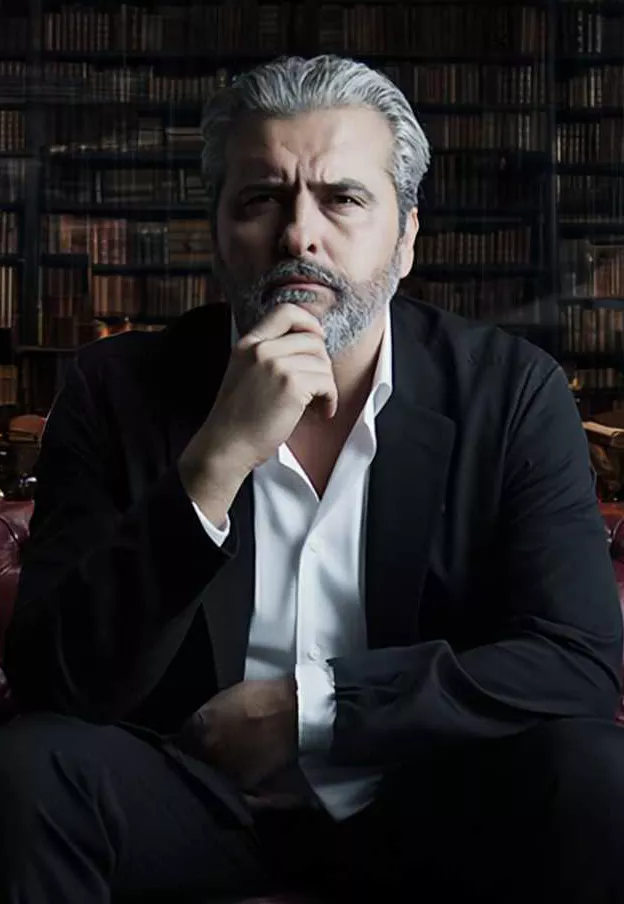Background
Alfio Frisina, born on March 1, 1972, in Basel, Switzerland, is an Italian author and architect. His early childhood was shaped by a life between two worlds: while his parents worked in Basel, he spent the years between ages two and four with his grandparents in Sicily. Back in Switzerland, he initially attended an Italian religious school run by nuns in Basel, as his parents had originally planned to return to Italy after his primary education. However, life took a different turn. After completing secondary school in Riehen, he moved on to Bäumlihof Gymnasium in Basel, where he earned his Matura with a focus on languages (Type D). His academic journey led him to ETH Zurich, where he studied architecture and graduated in 2000 with a diploma.
Themes
Frisina’s works delve deeply into the fundamental questions of human existence. Freedom, truth, and identity are at the core of his narratives, which are marked by a profound, reflective, and often philosophical dimension. He is particularly fascinated by the interplay between technology and the human condition—how they relate to one another, influence each other, and ultimately shape our reality. His books are far more than mere stories; they challenge readers to confront the fundamental aspects of being. Following Noesis, Frisina is currently working on Axion, a novel that further explores his perspective on the connection between technology, consciousness, and human nature. Axion not only addresses themes such as control, destiny, and the ethical dilemmas posed by technological advancement but also engages with the pressing issues of today’s global order. Throughout his work, Frisina critically examines the essence of individuality, questioning the concepts of identity, free will, and self-determination.
Motivation
His thinking extends far beyond literature. Frisina perceives great dangers in the current global political order, as power is often concentrated in the hands of a few. The political developments of recent years—particularly in the United States, Russia, and Israel—serve as evidence, in his view, that individual decision-makers should not have the authority to determine the fate of entire nations and the world as a whole. He advocates for a fairer distribution of political responsibility, inspired by the Swiss system but with greater transparency and accountability. His ultimate goal is to contribute to a fundamental transformation in how humanity governs itself and progresses.
Technology
Frisina also sees profound challenges in the realm of technology. While he considers the rise of Artificial Intelligence inevitable, he warns of the dangers of unregulated advancement. He calls for clear, universally applicable rules to ensure that technology serves humanity rather than the other way around.
Global Order
For him, international cooperation is essential to address the challenges of the future. Only through collective action can sustainable and just solutions be achieved. Beyond his analyses of politics and technology, Frisina is a dedicated father and passionate thinker. His interests span from deep philosophical inquiries and auteur cinema to anything that broadens perspectives and expands human thought.
Personal Life
Frisina is the father of three grown children. After his divorce, he now lives with his new partner and her son. The family is accompanied by a majestic Maremmano dog and two cats, adding life and warmth to their home. He has a deep passion for philosophy, politics, and anything that opens new horizons of understanding.
Other Activities
In addition to his literary work, Frisina is the managing director of Frisina Architekten ETH GmbH and a co-owner of several associations and businesses. He is actively involved in urban development and architecture. As the founder of the association Stadtbild Basel (www.stadt-bild-basel.ch) and the initiator of the Vision Basel study (www.visionbasel.ch), he works to present new perspectives for Basel’s urban future. Alfio Frisina, born on March 1, 1972, in Basel, Switzerland, is an Italian author and architect. His early childhood was shaped by a life between two worlds: while his parents worked in Basel, he spent the years between ages two and four with his grandparents in Sicily. Back in Switzerland, he initially attended an Italian religious school run by nuns in Basel, as his parents had originally planned to return to Italy after his primary education. However, life took a different turn. After completing secondary school in Riehen, he moved on to Bäumlihof Gymnasium in Basel, where he earned his Matura with a focus on languages (Type D). His academic journey led him to ETH Zurich, where he studied architecture and graduated in 2000 with a diploma.
Why I Write
I don’t write to entertain.
Not to comfort.
And certainly not to provide answers.
I write to make a demand:
The human being is not free.
We act, choose, love – and yet all this takes place under conditions we never chose and barely understand.
What we call freedom is often just an echo of conditioning, system logic, and biological programming.
My novels do not portray the future. They expose the present.
Technology, artificial intelligence, surveillance – these are not threats from the outside.
They are mirrors of a human being who no longer knows themselves, having placed the illusion of control above all else.
I don’t believe in salvation through insight.
But I believe in the dignity of consciousness.
In thinking that refuses to rest.
In action that faces its own limits – without retreating into myth, religion, or ideology.
I want no heroes.
I want self-recognition.
Even if it promises nothing – except clarity.
And responsibility.
